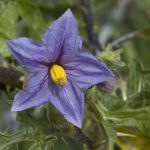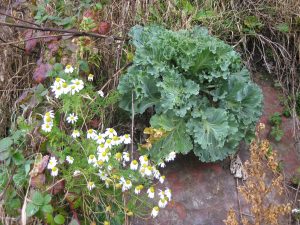The importance of conserving crop genetic resources, including the species regarded as Crop Wild Relatives (CWRs), is a subject that has featured quite a bit in this blog lately. Tiina Sarkinen’s review of the issues for Botanics Stories on 24th July highlighted how limited the knowledge and conservation collections of many CWRs are. Even seed banks devoted to conserving crop genetic diversity often have patchy coverage of the wild relatives of familiar crops.
Using the example of work on the potato family (Solanaceae) Tiina explains how important a good working knowledge of CWR species is. Genes in wild populations could be a source of many useful traits, like disease resistance, that we might wish to introduce into new crop varieties. If we don’t know what the CWR species are and where they grow we can’t put them to use, or even put in place conservation measures.
Scotland has CWR species of cabbage, sea beet and sea radish that have all been the subject of the Really Wild Veg project during 2013. The growing skills of the Edible Gardening Project have been put to use in developing trials that have seen these three CWR species grown alongside a heritage variety and a modern F1 hybrid.
By sharing details of the Really Wild Veg project on social media the worlds of crop genetic conservation and botanic gardens have forged a valuable link. Conservation projects are an important part of the work of botanic gardens and crop plants and their relatives are no exception to that. Luigi Guarino recently wrote about the need to remember that botanic gardens work on crop genetic conservation too in his Agricultural Biodiversity Weblog. I would argue that the taxonomic and horticultural expertise of botanic gardens places them in a very strong position to work with institutes concerned with crop genetic resources.
Seed samples from wild collections made during the Really Wild Veg project will be passed to the Genetic Resources Unit at Warwick to enhance their CWR collection. An example of the value of this collaboration is provided by the fact that Warwick currently has no Scottish origin wild cabbage. The collections made for the Really Wild Veg project will add to the Warwick collection and this in turn will provide further ex-situ conservation for what is quite a rare plant in Scotland.



1 Comment
1 Pingback